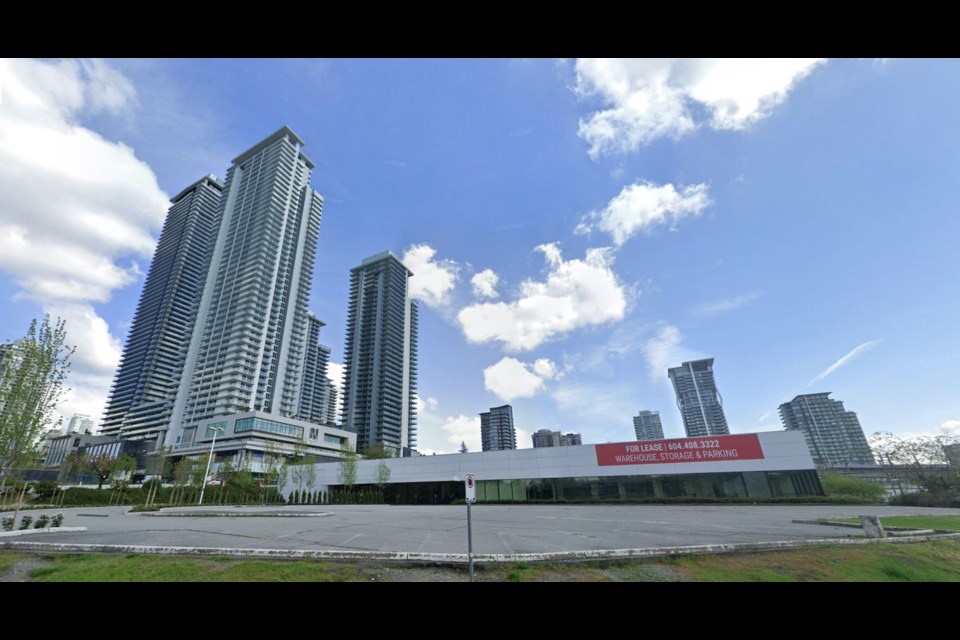Developers aren’t happy with a City of Burnaby proposal that would charge them $40,000 per parking stall they don’t have to build.
They say the cost will either be passed onto homebuyers or effectively shut down a project.
The proposal is part of an interim plan to reduce parking requirements within 800 metres of a SkyTrain station.
It specifically responds to an 80-storey development in Lougheed that currently has 14 floors of required parking.
The proposal would reduce the parking requirement in the development by 45 per cent, from 1,612 residential parking spots (the minimum number currently allowed by the city’s bylaws) to 879 spots.
The project by Pinnacle International at 9850 Austin Rd. and 9858/9898 Gatineau Pl. is directly across the street from Lougheed Town Centre SkyTrain station, a one-minute walk.
City staff and Pinnacle agreed building the current required minimum “would have significant impacts upon housing affordability” and the city’s climate goals, according to a staff report.
The proposed policy would reduce the parking minimum from the current requirement of 1.1 parking spots per strata unit to 0.6 spaces per unit.
Developers ‘completely opposed’
The interim policy would also require developers to pay $40,000 per stall in lieu of the reduced parking from the current 1.1 spaces per unit.
The money (called payment in lieu) would be funnelled into the city’s active transportation initiatives.
Current city policy charges a payment of $25,000 per commercial and industrial parking stall for up to 35 per cent of the required parking.
But developers aren’t happy about the new payment.
It would mean, for example, Pinnacle would pay $40,000 for each of the 733 parking spots it doesn’t have to build under the new proposed policy. It would cost the developer more than $29.3 million.
Jim Ralph, Pinnacle’s director of design and development, wrote to city council “completely opposed” to the parking stall fee, which he said “was never discussed with Pinnacle International.”
He added that, along with rising interest rates, the fee for reduced parking would place a “significant financial burden on Pinnacle and will ultimately cause housing prices to go up and not down as suggested in the report.”
Ralph noted all the parking stalls in the development will be equipped with EV chargers, and the developer will offer transit passes, a car share program and an e-bike share program.
“While also costly, these are effective measures and incentives, unlike the $40,000 per stall penalty proposed,” he wrote.
The Pinnacle development, which would include the tallest tower in Western Canada at 259.1 metres/850 feet high, plans for 1,067 commercial parking spaces and a total of 3,374 spaces for bicycles.
Canderel, which is developing two towers of condos and rentals at 3965 North Rd. right beside the Pinnacle development, said it is “very concerned” about the policy and asked for the city to remove the parking payment in lieu.
Senior executives Ryan Jenkins and Bryce Margetts at Canderel said the policy would cost them more than $12 million in “unforeseen additional costs” that would either be passed onto the buyers or cause the development to become “economically unfeasible.”
They said the policy could result in developers choosing to build more parking and “attempt to sell or retain ownership of the additional stalls rather than paying a fee to the city.”
“A project cannot charge the same market price for an apartment unit without a parking stall vs. one that has a parking stall included,” the executives wrote.
“The market will deliver more affordable units with a lower parking ratio and no parking in lieu payment. This is a market fact.”
“We also find it concerning that this interim policy, which was presented to us on Friday, June 16 is being considered by council on Monday, June 19, without any meaningful discussion with the building community, UDI or other stakeholders that it directly affects.”
Reducing parking minimums
The developers agreed that reducing parking minimums is “long overdue.”
It’s part of the city’s climate goals to have three-quarters of all trips made by public transit and active transportation by 2050, called “mode split,” which includes “discouraging private vehicle trips,” according to the city’s transportation plan.
The city has a higher target for mode split in its town centres, including Lougheed, planning to have 90 per cent of all trips made by public transit and active transportation by 2050.
“A significant number of vehicles would need to be taken off the road,” read the report.

The staff report reviewed Burnaby’s vehicle and parking requirements for the Pinnacle development and compared them to similar requirements in six other cities.
“Burnaby’s parking requirements on the whole were significantly greater than the rate of the comparable cities with respect to TOD,” according to the report.
Metro Vancouver’s 2018 regional parking study showed resident parking in stratas in Burnaby and New Westminster had an oversupply of an estimated 45 per cent.
Council refers proposal
The proposal was presented to councillors at their meeting on June 19, but it was referred to July’s planning and development committee meeting.
Coun. Sav Dhaliwal said the report was headed in the right direction but was concerned the committee had no chance to give input.
“It missed a number of, I think, good functions that should be included in the policy,” he said.
“I don’t want to be thinking of another interim policy; I want to be thinking of a policy that works for all,” Dhaliwal said, wanting to include industry, city, traffic management officials and consumers.
Mayor Mike Hurley said he wanted the policy to come quickly.
“The concern I have with that is, you know, there are some buildings really sitting waiting, … so I don’t want more massive parking lots being built if we don’t need them at this time. That’s why I would kind of like to keep the timelines tight.”
Council agreed the committee would discuss the policy on July 12, and it will likely return to council in August.





